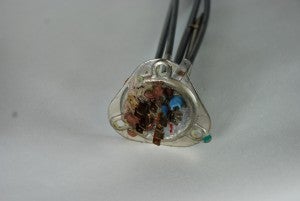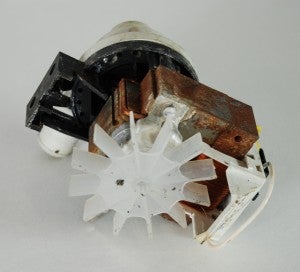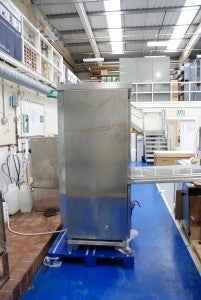Loading... 16 view(s)
Maintenance matters
David Pettit, Service Engineer, Camlab Limited, Camlab House, Norman Way Industrial Estate, Over, Cambridge CB24 5WE, United Kingdom
A laboratory glasswasher represents a significant financial outlay, and the importance of its correct use and maintenance should not be underestimated. Looked after well, it will serve the laboratory reliably day in, day out, for many years. But if mistreated, the result is unplanned periods of downtime, impacting on productivity. It is important to adopt good working practices to ensure long-term, trouble-free operation, thinking carefully about whether or not to invest in a service contract and which service provider to choose.
Laboratory glasswashers come in many sizes, from small systems comparable to a domestic dishwasher that cost from around £4,000 to larger, £25,000 machines standing two meters tall. They are the workhorse of the laboratory, in almost constant use day after day, and represent a considerable financial investment. Treated properly, they will function reliably for many years – there are 25-year old systems still in use today – becoming an indispensable asset to the laboratory.
[caption id="attachment_7789" align="alignleft" width="300"] Undetected corrosion affects performance[/caption]
Laboratories can help themselves
While laboratory glasswashers appear similar to their cheaper domestic counterparts, they are, in fact, far more complex pieces of equipment, and are more expensive for a reason. Made from high grade stainless steel, they are designed to withstand contact with everyday laboratory chemicals and will last for years. Domestic dishwashers may have a tempting price tag, but are constructed from a cheaper grade of stainless steel that quickly deteriorates in contact with chemicals. Not only that, but commercial use invalidates the guarantee. It is vital to use the correct tool for the job; a laboratory glasswasher.
All too often, laboratory glasswashers are misused, particularly in laboratories that have an open access policy and no designated responsible person. Laboratories can help themselves by adopting best practice and adhering to the manufacturer’s operating instructions. It may seem obvious, but using the correct type of salt for the water softener – granular salt, which dissolves slowly in water to produce brine – is important. Although it may be convenient to use refined salt if it is already available in the laboratory, it will need replacing twice as often and is half as efficient. Self-adhesive labels are another regular source of trouble. If labels are not removed from glassware, they come off during the wash, blocking the filters and adhering to the inside of the wash chamber; removing them can then be difficult. The solution is simple. Just remove all labels before washing, and periodically check the wash chamber’s main and fine filters to ensure that there are no blockages.
Glassware that has been used with foaming agents is also problematic; a foam-filled wash chamber causes the wash pump to draw in air, stopping the wash cycle. Laboratories routinely using foaming agents can opt to have a third peristaltic pump fitted that automatically dispenses antifoam solution into the wash chamber or, alternatively, the solution can be added manually prior to starting the wash cycle.
[caption id="attachment_7791" align="alignleft" width="300"]
Undetected corrosion affects performance[/caption]
Laboratories can help themselves
While laboratory glasswashers appear similar to their cheaper domestic counterparts, they are, in fact, far more complex pieces of equipment, and are more expensive for a reason. Made from high grade stainless steel, they are designed to withstand contact with everyday laboratory chemicals and will last for years. Domestic dishwashers may have a tempting price tag, but are constructed from a cheaper grade of stainless steel that quickly deteriorates in contact with chemicals. Not only that, but commercial use invalidates the guarantee. It is vital to use the correct tool for the job; a laboratory glasswasher.
All too often, laboratory glasswashers are misused, particularly in laboratories that have an open access policy and no designated responsible person. Laboratories can help themselves by adopting best practice and adhering to the manufacturer’s operating instructions. It may seem obvious, but using the correct type of salt for the water softener – granular salt, which dissolves slowly in water to produce brine – is important. Although it may be convenient to use refined salt if it is already available in the laboratory, it will need replacing twice as often and is half as efficient. Self-adhesive labels are another regular source of trouble. If labels are not removed from glassware, they come off during the wash, blocking the filters and adhering to the inside of the wash chamber; removing them can then be difficult. The solution is simple. Just remove all labels before washing, and periodically check the wash chamber’s main and fine filters to ensure that there are no blockages.
Glassware that has been used with foaming agents is also problematic; a foam-filled wash chamber causes the wash pump to draw in air, stopping the wash cycle. Laboratories routinely using foaming agents can opt to have a third peristaltic pump fitted that automatically dispenses antifoam solution into the wash chamber or, alternatively, the solution can be added manually prior to starting the wash cycle.
[caption id="attachment_7791" align="alignleft" width="300"] Timely maintenance is key[/caption]
In addition to good working practices, correct maintenance is essential. Laboratories have a range of service offerings to choose from, including ad hoc call-outs, and various independent third-party, distributor and manufacturer service contracts. Laboratories favouring a service contract – which may include on-site labour charges in the event of a breakdown – will usually have priority over ad hoc call-outs, but this is an ongoing commitment rather than a ‘one off’ cost. Making the right choice is crucial.
Ad hoc maintenance
Laboratories preferring to avoid the ongoing commitment of a service contract can opt to simply pay for engineer visits when a problem arises. While this may be cheaper in the short term, this reactive approach can result in longer periods of downtime in the event of breakdowns. The customer must call an engineer to explain the fault and, although it may be possible to resolve the issue over the phone, it is often necessary to provide an estimate for the repair and wait for authorisation before proceeding, prolonging downtime. The cost of any spare parts required may also be higher, as customers with a distributor or manufacturer service contract usually receive a discount.
Independent third-party service contracts
Choosing a service contract from an independent third-party rather than the distributor or manufacturer may, initially, appear to be the cheapest option, but there are some essential questions to ask before taking this route. Have the engineers been trained to service the laboratory’s particular make and model of glasswasher? Do they have sufficient in-depth knowledge to identify and resolve potential issues before a breakdown arises, to establish whether or not the system is working at 100 % efficiency, or to prevent minor problems escalating into major issues? Are the engineers sufficiently familiar with the system to know which parts should be replaced at regular intervals, and the implications of failing to do so? A typical example is the tubing on peristaltic pumps, which must be replaced at specified intervals to avoid leakage; the use of strong detergent and an acid rinse eventually causes the tubing split which, if undetected, leads to general corrosion of the glasswasher. It is vital that the company recognises the importance of these issues and thoroughly trains its engineers on every type of system it maintains.
[caption id="attachment_7793" align="alignleft" width="201"]
Timely maintenance is key[/caption]
In addition to good working practices, correct maintenance is essential. Laboratories have a range of service offerings to choose from, including ad hoc call-outs, and various independent third-party, distributor and manufacturer service contracts. Laboratories favouring a service contract – which may include on-site labour charges in the event of a breakdown – will usually have priority over ad hoc call-outs, but this is an ongoing commitment rather than a ‘one off’ cost. Making the right choice is crucial.
Ad hoc maintenance
Laboratories preferring to avoid the ongoing commitment of a service contract can opt to simply pay for engineer visits when a problem arises. While this may be cheaper in the short term, this reactive approach can result in longer periods of downtime in the event of breakdowns. The customer must call an engineer to explain the fault and, although it may be possible to resolve the issue over the phone, it is often necessary to provide an estimate for the repair and wait for authorisation before proceeding, prolonging downtime. The cost of any spare parts required may also be higher, as customers with a distributor or manufacturer service contract usually receive a discount.
Independent third-party service contracts
Choosing a service contract from an independent third-party rather than the distributor or manufacturer may, initially, appear to be the cheapest option, but there are some essential questions to ask before taking this route. Have the engineers been trained to service the laboratory’s particular make and model of glasswasher? Do they have sufficient in-depth knowledge to identify and resolve potential issues before a breakdown arises, to establish whether or not the system is working at 100 % efficiency, or to prevent minor problems escalating into major issues? Are the engineers sufficiently familiar with the system to know which parts should be replaced at regular intervals, and the implications of failing to do so? A typical example is the tubing on peristaltic pumps, which must be replaced at specified intervals to avoid leakage; the use of strong detergent and an acid rinse eventually causes the tubing split which, if undetected, leads to general corrosion of the glasswasher. It is vital that the company recognises the importance of these issues and thoroughly trains its engineers on every type of system it maintains.
[caption id="attachment_7793" align="alignleft" width="201"] Camlab Service Centre[/caption]
Check the availability of parts too – do engineers carry spares with them, enabling same day diagnosis and repair? Or will parts have to be ordered in specially and fitted during a second visit, causing an increase in downtime and impacting on productivity? What happens if there is uncertainty surrounding the problem, and the cause of the fault has to be determined by a process of elimination, ordering several different parts to try out? Who pays for parts that were actually working correctly and did not need replacing? It is important to establish these fine details at the outset. Failure to do so could be an expensive mistake, resulting in escalating costs that significantly exceed the cost of a distributor or manufacturer service contract.
Distributor and manufacturer service contracts
Service contracts are about much more than an annual visit to the laboratory to check the system. Although a service contract with a distributor or manufacturer may, at first glance, appear more expensive, it is frequently the most cost-effective option. Manufacturers and distributors provide after sales support through a network of experienced, well-trained engineers with an in-depth knowledge of the systems they service. They may, like Camlab engineers, have access to sophisticated diagnostic software that is not available to independent third parties. This allows them to monitor and interrogate computer-controlled glasswashers via a laptop, detecting changes in performance and minor faults during preventive maintenance – often before the user is even aware of them – and restoring 100 % operating efficiency by small adjustments or component replacements. Combined with visual inspection, this helps to avoid situations where a minor issue goes undetected, causing additional failures that quickly escalate into a major repair.
Expert engineers responding to a breakdown call-out will already have a good idea of the cause of a reported fault, and will arrive equipped with the most commonly required spare parts. Where the cause of a fault is unclear, this access to a range of spares enables the problem component to be determined rapidly by a process of elimination, ensuring that only the defective part is replaced, minimising the cost to the customer. Same day repair is generally possible, eliminating the wait for delivery of specially ordered parts and keeping system downtime to a minimum.
Good maintenance is the key
The adoption of good working practice, combined with regular inspection and servicing, is the key to maintaining the long-term efficiency of a laboratory glasswasher. There is a range of service options to choose from and, after careful consideration of the benefits and drawbacks, each laboratory must select the one most appropriate for its needs. Cheapest is not necessarily best; the right expertise is more important. For a great many laboratories, a distributor or manufacturer service contract will prove the most cost-effective route.
Contact us for more information on service contracts
Request Information
Camlab Service Centre[/caption]
Check the availability of parts too – do engineers carry spares with them, enabling same day diagnosis and repair? Or will parts have to be ordered in specially and fitted during a second visit, causing an increase in downtime and impacting on productivity? What happens if there is uncertainty surrounding the problem, and the cause of the fault has to be determined by a process of elimination, ordering several different parts to try out? Who pays for parts that were actually working correctly and did not need replacing? It is important to establish these fine details at the outset. Failure to do so could be an expensive mistake, resulting in escalating costs that significantly exceed the cost of a distributor or manufacturer service contract.
Distributor and manufacturer service contracts
Service contracts are about much more than an annual visit to the laboratory to check the system. Although a service contract with a distributor or manufacturer may, at first glance, appear more expensive, it is frequently the most cost-effective option. Manufacturers and distributors provide after sales support through a network of experienced, well-trained engineers with an in-depth knowledge of the systems they service. They may, like Camlab engineers, have access to sophisticated diagnostic software that is not available to independent third parties. This allows them to monitor and interrogate computer-controlled glasswashers via a laptop, detecting changes in performance and minor faults during preventive maintenance – often before the user is even aware of them – and restoring 100 % operating efficiency by small adjustments or component replacements. Combined with visual inspection, this helps to avoid situations where a minor issue goes undetected, causing additional failures that quickly escalate into a major repair.
Expert engineers responding to a breakdown call-out will already have a good idea of the cause of a reported fault, and will arrive equipped with the most commonly required spare parts. Where the cause of a fault is unclear, this access to a range of spares enables the problem component to be determined rapidly by a process of elimination, ensuring that only the defective part is replaced, minimising the cost to the customer. Same day repair is generally possible, eliminating the wait for delivery of specially ordered parts and keeping system downtime to a minimum.
Good maintenance is the key
The adoption of good working practice, combined with regular inspection and servicing, is the key to maintaining the long-term efficiency of a laboratory glasswasher. There is a range of service options to choose from and, after careful consideration of the benefits and drawbacks, each laboratory must select the one most appropriate for its needs. Cheapest is not necessarily best; the right expertise is more important. For a great many laboratories, a distributor or manufacturer service contract will prove the most cost-effective route.
Contact us for more information on service contracts
Request Information





